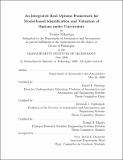An Integrated Real options Framework for model-based identification and valuation of options under uncertainty
Author(s)
Mikaelian, Tsoline
DownloadFull printable version (3.907Mb)
Alternative title
IRF for model-based identification and valuation of options under uncertainty
Other Contributors
Massachusetts Institute of Technology. Dept. of Aeronautics and Astronautics.
Advisor
Daniel E. Hastings.
Terms of use
Metadata
Show full item recordAbstract
Complex systems and enterprises, such as those typical in the aerospace industry, are subject to uncertainties that may lead to suboptimal performance or even catastrophic failures if unmanaged. This work focuses on flexibility as an important means of managing uncertainties and leverages real options analysis that provides a theoretical foundation for quantifying the value of flexibility. Real options analysis has traditionally been applied to the valuation of capital investment decisions by considering managerial flexibility. More recently, real options have been applied to the valuation of flexibility in system design decisions. However, different applications of real options are often considered in isolation. This thesis introduces an Integrated Real options Framework (IRF) that supports holistic decision making under uncertainty by considering a spectrum of real options across an enterprise. In the context of the IRF, enterprise architecture is described in terms of eight views and their dependencies and modeled using a coupled dependency structure matrix (C-DSM). The objective of the IRF is to leverage the C-DSM model in order to identify and value real options for uncertainty management. The contributions of this thesis are as follows. First, a new characterization of a real option as a mechanism and type is introduced. This characterization disambiguates among 1) patterns of mechanisms that enable flexibility and 2) types of flexibility in a system or enterprise. Second, it is shown that a classical C-DSM model cannot represent flexibility and options. (cont.) The logical C-DSM model is introduced to enable the representation of flexibility by specifying logical relations among dependencies. Third, it is shown that in addition to flexibility, two new properties, optionability and realizability, are relevant to the identification and analysis of real options. Fourth, the logical C-DSM is used to estimate flexibility, optionability and realizability metrics. Methods that leverage these metrics are developed to identify mechanisms and types of real options to manage uncertainties. The options are then valued using standard real options valuation techniques. The framework is demonstrated through examples from an unmanned air vehicle (UAV) project and management of uncertainty in surveillance missions.
Description
Thesis (Ph. D.)--Massachusetts Institute of Technology, Dept. of Aeronautics and Astronautics, 2009. This electronic version was submitted by the student author. The certified thesis is available in the Institute Archives and Special Collections. Includes bibliographical references (p. 217-231).
Date issued
2009Department
Massachusetts Institute of Technology. Department of Aeronautics and AstronauticsPublisher
Massachusetts Institute of Technology
Keywords
Aeronautics and Astronautics.